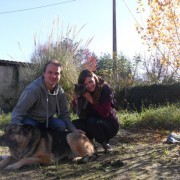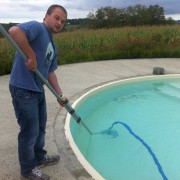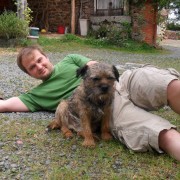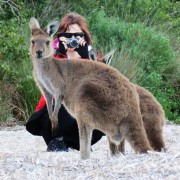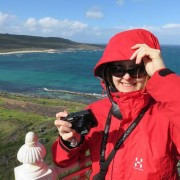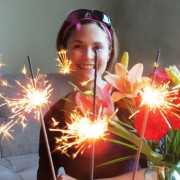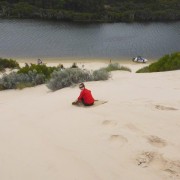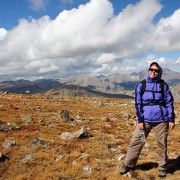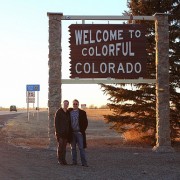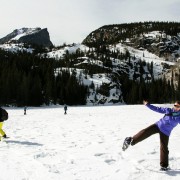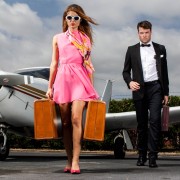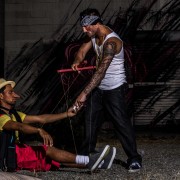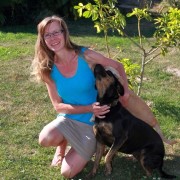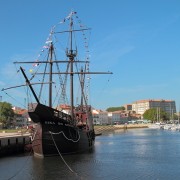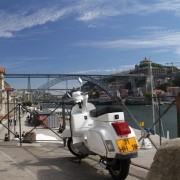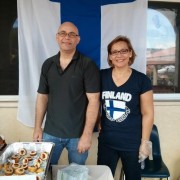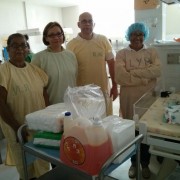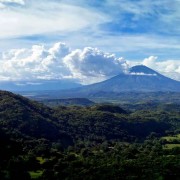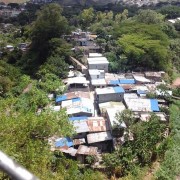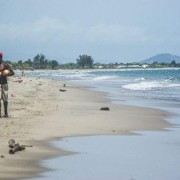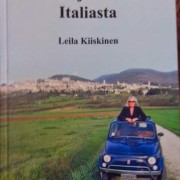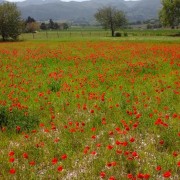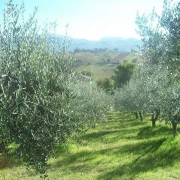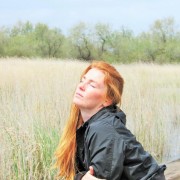Hi, who are you?
Hi there, my name is Anu Besson. I live in Perth, Western Australia. Originally I’m from Finland, but I don’t really have a home town there – my family moved a lot due to my dad’s work when I was growing up. I have often wondered if that sparked the wanderlust in me, or would I have become who I am even if growing up rooted in one spot. I love travelling, nature, reading, writing, studying, new experiences and also interacting in social media (which involves defending causes I believe in on online forums!). Naturally I also love my hansom husband; my family and relatives back in Finland, and my friends in both Finland and Australia.
How did you end up in Perth of all places?
Half planning, half chance. I have known since my teenage years that I want to see more of this world than just my backyard. Since I turned 18, I saved all my money, travelled around Scandinavia first, then around Europe, then I undertook exchange studies in Hungary and Canada and added some travelling to these periods too.
In Finland, I studied an assortment of subjects related to visual arts, culture, communication and history. I loved studying, but after graduating with my Master’s degree I felt that my life stagnated. By 2010, when I was in my late 20’s, I was really unhappy with pretty much everything in Finland: my job, my dull city, my dull and middle-aged life, living far away from my friends due to my partner’s studies, the weather, the long nights of each winter, the whining and pessimistic Finns depressed by the said long winter… Finally I decided it’s time for a complete turnaround in my life.
In 2011, I sold all my belongings, quit my job, took a leap of faith and boarded a plane to Perth, Australia. I craved for a change and adventure. I had never been to Australia. Sunny Perth sounded like as good place as any. In my pocket I had a working holiday visa for a year, but no longer-term security. All I had was bucketful of Finnish sisu: determination, persistence and courage to make it. This major change led me to end my then long-term relationship, because I realized it wasn’t what I was looking for.
What is the essence of Perth and Australia to you?
Australia is all about the great outdoors and sunny, jolly, carefree people. Aussies absolutely love outdoor activities like camping, fishing, surfing, swimming, picnics, barbecues, outdoor sports… Perth has a Mediterranean climate of dry, hot summers and mild, rainy winters; spring and autumn in between are picture perfect outdoor seasons. Perth’s also one of the sunniest cities in the world with 200 days of average annual sunshine, and that keeps people positive and relaxed.
In Australia, life is good for most people. Of course same issues exist here than everywhere else: you can’t fully eradicate poverty, violence, drugs, homelessness, racism… But by and large, Australia is one of the happiest, wealthiest countries on earth, where a comfortable life is quite easily secured, if you are willing to be industrious and work for it. Australia is not called “the lucky country” for nothing.
The nature of Down Under is breathtaking. The sea, beaches, cliffs, bushland, outback, rainforests… not to mention all the cutsie animals such as kangaroos, wallabies, koalas, wombats, dolphins and the little furry fellows I had never heard of before: quokkas, potoroos and alike, which are like a cross breed between a bunny and a kangaroo.
Australia is famous for the beach lifestyle and for the tanned, blonde, fit surfer guys and gals. Aussies in general are very much into sports: either by doing sports or watching sports on telly – or both. Australia is a vibrant melting pot of almost all of the nationalities of the world, and for me it’s a merry mix of European, South East Asian, Indian, Chinese and Pacific cultures, traditions, influences and cuisine, all stirred happily together under the mellow (and at times scorching!) Australian sun.
Is it easy to find a job in Australia? What’s your job like?
As a foreigner it’s always harder to convince the potential employer that you are as good as or even better than natives; you don’t have the same contacts or social and professional networks. The authenticity of your qualifications will be unfairly questioned (because they are foreign). Aussies trust recommendations and references: it’s essential to quickly find a reliable referee (recommender) who’s willing to put in a favorable word for you.
There’s a lot of competition in the job market, because Australia is seen as the golden land by many Europeans and Asians: during economic boom times, young adults flock in from every corner of the world. This is of course in addition to Aussie job seekers. In Australia, personal contacts matter a lot. Jobs are often found through social networks, or through relentless searching and phoning. Never email, always call, or if possible, visit in person to drop in your resume and have a chat.
I found a job much more easily than expected, due to the huge mining boom and the ensuing demand for professional workforce back in 2011. Now the boom is over and times are much tougher. I have worked in the same job since I arrived: as a compliance professional on a legal and risk management area. My job is very detail-oriented, which easily makes it tedious and repetitive. It’s not what I had in mind when I arrived, but I consider myself lucky to have found such a steady well-off deal.
How do you see Aussies being different from your countrymen especially in business– also culturally, what stands out in your chosen profession?
The biggest difference – that I am still adjusting to after four years – is how friendly, sociable, considerate and polite Aussies are at work. Social life and work life are much more mixed than in Finland, where people usually socialize only with their families and close friends, and the relationships with colleagues often remain a bit distant and business-like.
In Australia, it’s common to bring your spouse or family to after-work events and usually colleagues get to know your family at least by name if not better. If someone goes on parental leave, they’ll soon bring their new offspring to the workplace for everyone to greet and admire. Colleagues also always organize a collection of small donations amongst themselves to buy a set of gifts to the new baby of an employee.
Aussies like to socialize over sundowners, aka after-work drinks, and also through sports. I play sports in a number of different social leagues, which means friendly games in mixed teams of guys and gals playing together. It’s also possible to become close friends with your colleagues and even with their friends or partners, because you get to meet these ‘second tier friends’ in all sorts of social events and gatherings. For example, I’ve been invited to my colleagues’ birthdays and housewarming parties; and I have also organized similar parties, where friends from different social circles mix and socialize happily.
Finns are easily seen as a bit clinical, business like, direct and even rude in an Aussie business world, because for a Finn, work is work and it’s about getting things done efficiently, and social circles are what exist outside of work, with your ‘real’ friends. I have had to consciously practice small talk, smiling, holding an eye contact, personal warmth and friendliness – not that I wouldn’t know how to be friends, I just wasn’t used to being so warm and friendly at the very first meeting. It’s a big social no no to be on an openly bad mood at work. Finns might think it’s honest to show how you really feel, but Aussies think it’s a sign of a selfish jerk if you can’t maintain a polite exterior in a business environment.
What would be your dream job?
I would love to work for a “greater cause”, for something that I consider really meaningful – what would make me feel excited and charged every morning. There are plenty of charitable causes I’d like to work for. However, I also appreciate financial security after years of shaky financial status as a student. I haven’t yet found a dream job that would be both thrilling and financially secure (if such a job exists…). I am the director of Perth Finnish School and I also teach adult groups there, so I do have a chance to volunteer for a good cause.
My current job does offer something that is a component of a dream job: flexibility and financial security, which I equate with freedom. I have a comfortable salary and a reasonably flexible employer. I am able to take more holidays than normally; and on top of it, an occasional day off when I need one. Australia is a great place to work for an educated professional, because jobs requiring university degrees are often very well paid. It does take a lot of persistence, trial and error – and luck – to land on a good deal though.
What do you absolutely miss from your country?
From Finland, I miss what every single expat Finn on earth misses: salmiakki, i.e. salty licorice. It’s a specialty which is very difficult to find anyplace else, at least in as great varieties and quantities as in Finland. I also miss nature, such as the pristine lakes and dark green pine and spruce forests, the delicate white birches, the timid greenness of spring, the fireworks of autumn colours; and Christmas wrapped in snow, quiet darkness and candlelight. Christmas under a decorated palm tree is just not the same.
When I’m not in Australia I miss the happy chit-chat and the easygoing, friendly socialness of Aussies; the relaxed chirping of parrots and other birds, the golden colour of sunlight, and the never-ending summer. For a Finn, Perth doesn’t have a winter. Yes, they call the cooler rainy season winter but it really isn’t. Not without proper below zero degrees and frost and snow. There’s never snow in Perth but you might catch some frost for a few days per year. Not a convincing winter for someone who’s originally from the Arctic Circle!
Obviously, I also miss people from both countries. Luckily today it’s quite easy to stay in touch via social media, email and skype, and upload photos to Facebook, Instagram and my blog to keep everyone updated.
Where do you recommend tourists to go to in Australia/Finland and why?
In Finland, visiting Lapland is a must. Lapland is a showstopper in winter and a fascinating region even during summer. You’ll see wild reindeer herding in the vast, beautiful barren and melancholic landscape, and you’ll forget all the stress and buzz of the modern urban life. In winter, try staying in Kemi Snow Castle, an ice and snow hotel decorated by ice carvings and built from a scratch every year. The room temperature is -5C!
Finland is a land of hundreds of thousands of lakes, all surrounded by forests, and it boasts four very different seasons with a distinctive vibe each. It’s an amazing country to visit for a nature lover. You don’t even have to seek a “remote” area to experience nature: normally, a 15-30 minute drive out of any city will land you to the edge of forest, and off you go, exploring. Always carry a map and a compass though if you’re not familiar with trekking. In autumn, you can eat wild blueberries and raspberries straight from the bush, and try Finnish specialties: wild lingonberries (like small cranberries) and cloudberries (like tart, yellow raspberries in an individual stem each). Camp at a lakeshore in a forest overnight if you can; it will be an experience you’ll never forget. Finding a simple cottage to rent is easy, or you can even take a tent, if you’re more adventurous.
Australia in turn is a perfect combination of vibrant, lively cities and beautiful nature. You’ll easily find equally white sand beaches and turquoise water as in “more exotic” destinations such as Vanuatu or Fiji. In Western Australia, all the beaches around Perth are well worth visiting. For more exotic vistas, drive all the way to Esperance – the home town of the world-famous Twilight Beach – and visit the Fitzgerald National Park on your way, preferably in spring. The bushland blooms vibrantly in August-November, and it’s an amazing wonder to witness: the dry landscape sparks alive with thousand hues of green, yellow, orange, red and lilac.
In Perth, visit any small coffee shop and you’re in for a treat. Coffee in Australia is consistently very good, because Aussies take their coffee seriously. Almost every coffee shop sells delicious freshly baked goods and a massive slice of moist cake or a lemon merengue pie will definitely make your day. Sample some gourmet burgers for lunch – there are a number of small independent burger places to choose from – and hit the town for night in any small quirky bar selling craft beer or a wide selection of Australian and international wines to choose from.
What has been the worst social or cultural issue to deal with in Australia for you?
Facing racism has been completely unexpected. I myself have mostly been spared, probably because I’m a white European female, i.e. perceived as “fitting in” and harmless. Even though Aussies in general are a jolly and jovial bunch, there are some rotten eggs in the basket: the xenophobic, islamophobic and downright racists. My husband faces racism more often than me, because for some reason French are not always as well received as Finns. Paris has a reputation of being the capital city of the arrogant and rude, and this is sometimes unfairly reflected on my lovely husband before people get to know him.
At the beginning, I received some hints about being slow or stupid, if I couldn’t immediately understand or reply in English, or people didn’t understand my accent. That really frustrated me, because the people belittling me were always the ones who had never learned another language, hadn’t travelled much, and yet they felt superior just because they were born and raised here. These encounters are rare though.
In the society’s scale, I’d say the most challenging social issues are the status of the Aboriginals, and the prevalent drug use in Perth. Aboriginals in turn have traditionally suffered from racism and also from clash of cultures, as they have not had a clear direction what to do and how to live in this new, urban world. Drugs came into the picture during Perth’s mining boom, which lasted almost a decade and it resulted in heaps of free flowing money, and unfortunately many people developed a taste for drugs.
Knowing more about life and having lived with your decisions for a while (like study/work) – would you still choose to be there and why or why not?
Let me start with a bit of a detour. I like to read about popularized quantum physics because I’m really interested in the big questions such as how the universe came to be, why it exists and is there a bigger meaning behind all this. I just read an article about how quantum physicists have found that the linearity of time is not as clear cut as we might perceive with our human senses. In the quantum world, it appears that sometimes a consequence can precede the cause; i.e. the future determines the past.
It’s incredibly fascinating, even though I don’t claim I fully understand this stuff. But it does make me wonder, what if the future really affects the past somehow? Throughout my life I’ve felt that there’s been a storyline unfolding, and the events that happened in the past make a lot of sense when I reach a point in future when I can see the full pattern. Of course I realise it might just be me trying to make sense of everything, and trying to see even negative events in a positive light. But I do believe we can learn from every decision and action we take and every event that happens to us.
Knowing what I know now about my life, I wouldn’t change anything. I studied a mix of artsy subjects which haven’t helped me much workwise, and at some stage I thought I had made a poor choice. But later on I realized that through my art history studies I acquired heaps of Dan Brown and Da Vinci Code type material to write the novel I’ve been dreaming about. I’m currently working on it and hopefully will get it published someday – sooner rather than later.
Also, before I came to Australia, I had a plan to work in international politics in Brussels (I’m a Greens voter), but I didn’t manage to make it happen. If I had taken that path, I would have never met the love of my life here in Perth and I wouldn’t have got the other positive things I have in my life now. What matters the most is that I now feel that I’m at home, emotionally. I’ve arrived to where I’m supposed to be.
Would you stay in Australia – yes or no?
I can easily see myself living in Australia for the rest of my life. We just bought our first own home – a cozy little apartment at the fringe of the city – and life seems full of opportunities here.
However, I live by the rule “never say never”. My husband is French and I’m a Finn, even though we are both about to obtain also Australian citizenships. Maybe someday moving back to Europe, closer to our families, will appeal to us. We both love travelling and new experiences, so lately we have been bouncing back and forth the idea of moving on from Perth; maybe to the east coast of Australia, maybe to New Zealand, maybe to Canada. Not necessarily for the rest or our lives, but for a few years, just to try it out. Time will tell. That’s the exciting thing about life. As the famous Finnish poet, J.L. Runeberg said circa 1850: viel’ uusi päivä kaikki muuttaa voi – there’s always the next day that can change everything.
How to connect with you:
Facebook: Life in English www.facebook.com/anulifeinenglish
Website: lifeinenglish-australia.blogspot.com.au/
Linkedin: Anu Besson
Instagram: @anumarji

